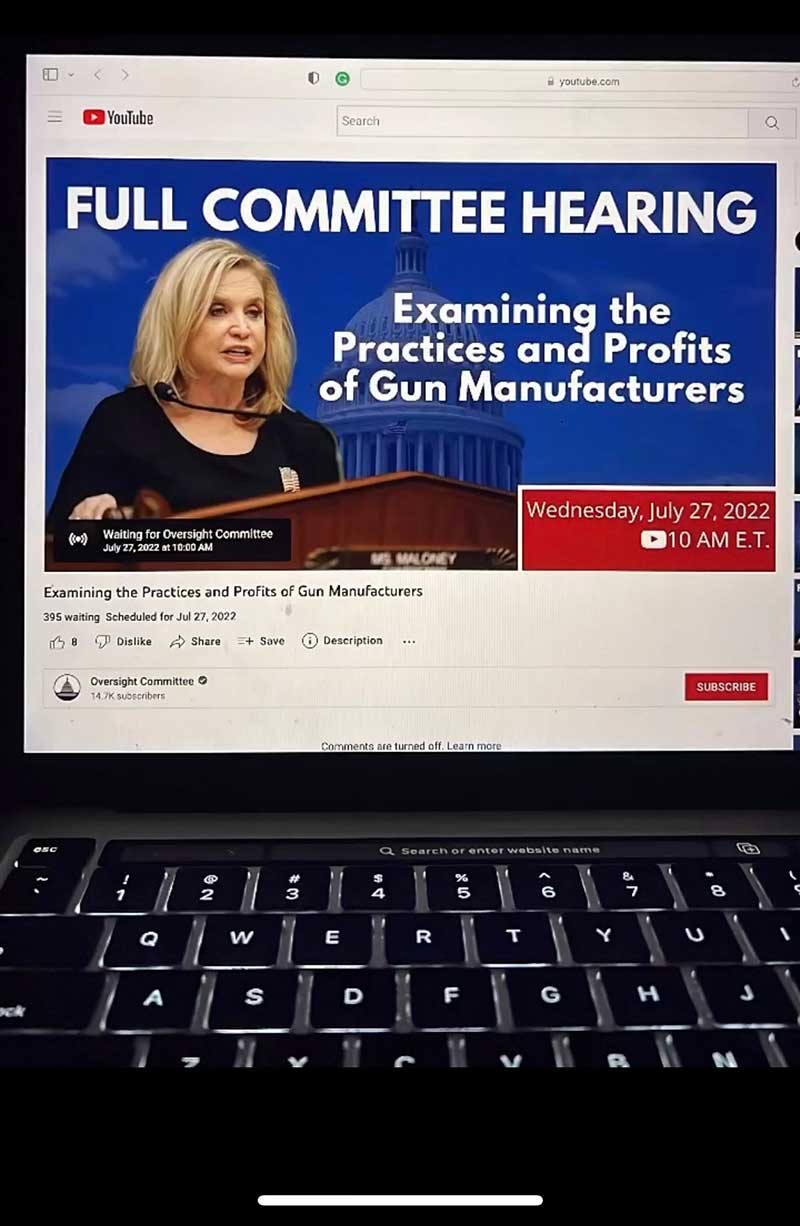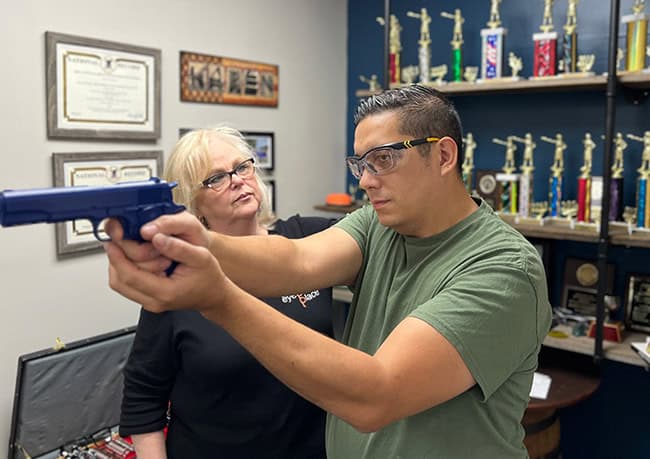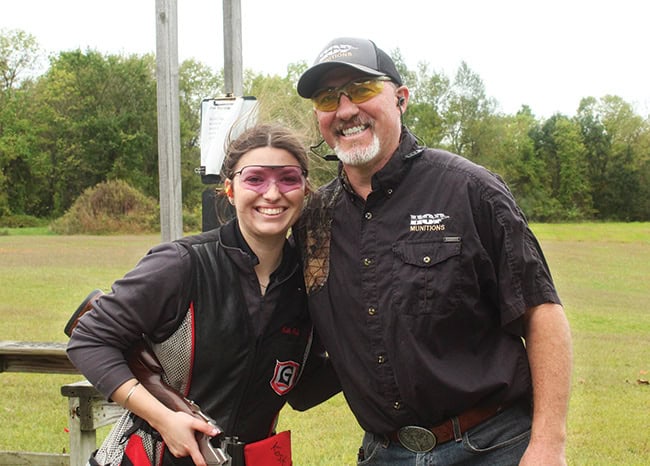House Oversight Committee
Hearing Speaks Volumes
It was a day that will do little to sway those diametrically opposed in the battle for gun rights in the U.S. July 27, the House Committee on Oversight and Reform hosted a hearing on “Examining the Practices and Profits of Gun Manufacturers.”
On the left, it was an opportunity to “demand answers and accountability from the gun industry.” On the right, it was political theatre — featuring near-unanimous baseless claims and unfeasible demands from Congressional members with a “D” next to their name.
The hearing featured the testimony of Chris Killoy, Ruger president and CEO, and Marty Daniel, founder and CEO of Daniel Defense, (both via Zoom), along with in-person testimony from Ryan Busse (Giffords), Kelly Sampson (Brady: United Against Gun Violence) and Antonia Okafor (Gun Owners of America). Mark Smith, president and CEO of Smith & Wesson, was invited but did not attend. In a viral moment, the hearing briefly featured fireworks between members: with Reps. Clay Higgins (R-LA) and Gerry Connolly (D-VA) engaged in a heated exchange.
The Hearing’s Intentions
In her opening statement, Chairwoman Carolyn Maloney (D-NY) made clear her reasoning for holding this hearing: “The gun industry has flooded our neighborhoods, our schools, and even our churches and synagogues with these deadly weapons [AR-15s] — and has gotten rich doing it. That is why I launched an investigation into the gun industry.”
A memo published July 27 to members of this committee claimed Smith & Wesson, Ruger, Daniel Defense, SIG SAUER and Bushmaster “collected more than $1 billion over the last decade” through the sales of AR-15s/MSRs. This number, though good for headlines, is more of an approximation, as SIG did not provide a revenue estimate, while Smith & Wesson submitted aggregate “long gun” revenues.
Stating “the time for dodging responsibility is over,” Rep. Maloney threatened to subpoena Mark Smith and other S&W senior executives “to finally get answers about why this company is selling assault weapons to mass murderers.”
Response From Ruger, Daniel Defense
In the face of such accusatory rhetoric, Killoy and Daniel represented the industry admirably.
In his written testimony, Killoy stated: “I believe it is important for me to address certain misguided legislative proposals likely to be discussed during today’s hearing. As an initial matter, I would submit to this Committee that any focus on ‘gun’ violence is misplaced. We at Ruger believe in and support a focus on the reduction of criminal violence, and believe that this should unquestionably be the Committee’s primary goal.”
When asked by Maloney “is there any number of shootings in schools, churches and synagogues that would convince you to stop selling weapons of war to civilians?”
Killoy answered, “Respectfully, Congresswoman, I don’t consider the modern sporting rifles that my company produces to be weapons of war. And like all Americans I grieve when we read about these tragic incidents.”
When sharing what the industry has done, Killoy rightly pointed out the Southerland Springs shooter should not have been allowed to purchase the firearm used in the attack (which lead to the FixNICS Act being passed in 2017, advocated for years by the industry). Maloney abruptly “reclaimed her time” — which occurred dozens of times throughout the hearing on both sides when an answer given didn’t fit a member’s agenda.
In Daniel’s written testimony, he referenced the “commonly owned” aspect of AR-15/MSRs: “I’m concerned that the stated and implied purpose of this hearing is to vilify, blame, and try to ban over 24 million modern sporting rifles currently in circulation that are lawfully possessed and commonly used by millions of Americans to protect their homes and loved ones, to safely sport shoot with family and friends and to put food on the table as licensed hunters.”
Responding to Rep. Maloney’s request to take “responsibility” for rifles used in mass shootings, Daniel rightly pointed out it’s not the object but the person who wields it — as millions of lawful gun owners can attest. He began to answer, “These acts are committed by murderers. The murderers are responsible …” — before being cut off abruptly by the chairwoman.
Attacks Against The Industry
During the hearing, Democrat members of the committee showcased their vehement dislike and ignorance of a top-selling platform. What stood out to us:
• They really don’t like MSRs: throughout this hearing, Democrat members repeatedly labeled MSRs as “weapons of war” or “dangerous weapons.”
• They don’t like how MSRs are marketed: Democrat members chastised Killoy and Daniel for “irresponsible advertising” — likening marketing materials from industry manufacturers to those in the tobacco industry decades ago and today’s opioid epidemic. During the hearing, Rep. Shontel Brown (D-OH) stated: “History is repeating itself and gun manufacturers are playing fast and loose with their advertising. If they do not take responsibility for the weapons of war they are selling to the public, Congress will gladly step in and do so for them.”
• They know little about the companies “under investigation”: This won’t come as much of a surprise to those reading this, there were numerous instances when the Congressional members simply did not know what they were talking about.
In one exchange, Rep. Raja Krishnamoorthi (D-IL) asked Killoy if Ruger would commit to not “sell a weapon that tears through bullet proof vests.” Killoy responded: “Congressman, with all due respect, the ability to pierce body armor typically relates to the ammunition, not the firearm.” Rep. Krishnamoorthi then asked if Ruger would stop making that ammunition — which it does not.
• They blame “Buy Now, Pay Later” financing: Democrat members blamed the “buy now, pay later” financing available through providers like Credova — claiming its too attractive to impulsive younger customers.
Rep. Stephen Lynch (D-MA) implied a consumer’s credit history should have an impact on whether or not he or she can purchase a firearm: “[‘Buy Now, Pay Later’] runs contrary to all the checks we’re asking to be implemented to prevent the wrong people from actually getting access to firearms.”
• Other points of contention centered on the Democrats’ proposed repeal of the Protection of Lawful Commerce In Arms Act, firearms tracing from manufacturers, increased government oversight of firearms manufacturers and more.
What Does It All Mean?
This hearing sought to frame the industry as reckless, putting profits over safety and as the source of growing violence — without addressing other social issues at hand.
“Ironically, cities with the worst crime rates are the hardest places to buy guns,” said Rep. James Comer (R-KY), ranking member on the committee. “Republicans want to target criminals. Democrats want to target lawful gun owners and take away their guns.” With the midterms approaching, there’s a strong likelihood Congressional Democrats are running out of time to restrict gun rights. Regardless, this Congressional hearing has set the stage for future entanglements involving gun rights.
So where does this leave those “in the middle?” Well, consumers of all backgrounds continue to voice their opinions through their wallets. This fact was noted by Rep. Andrew Clyde (R-GA), who concluded: “it’s a pretty strong opinion across the nation.”
A Democrat majority Congress is in serious threat of evaporating after the midterms — and they know they’re running out of time. This is why the industry’s #GUNVOTE efforts are going to be critical. As Congress prepares to vote on a renewed Assault Weapons Ban, the Second Amendment is most definitely on the ballot come November.





